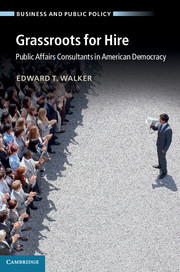Book contents
- Frontmatter
- Dedication
- Contents
- List of figures
- List of tables
- Acknowledgements
- Part I Sources
- Part II Structure
- Part III Outcomes
- Appendix 1 Identifying consulting firms (baseline data)
- Appendix 2
- Appendix 3
- Appendix 4
- Appendix 5
- Appendix 6 Models of consulting for non-trade associations
- Appendix 7 Models of consulting for trade associations
- Appendix 8 On public affairs consulting as a profession
- Bibliography
- Public documents referenced
- Index
Appendix 6 - Models of consulting for non-trade associations
Published online by Cambridge University Press: 05 June 2014
- Frontmatter
- Dedication
- Contents
- List of figures
- List of tables
- Acknowledgements
- Part I Sources
- Part II Structure
- Part III Outcomes
- Appendix 1 Identifying consulting firms (baseline data)
- Appendix 2
- Appendix 3
- Appendix 4
- Appendix 5
- Appendix 6 Models of consulting for non-trade associations
- Appendix 7 Models of consulting for trade associations
- Appendix 8 On public affairs consulting as a profession
- Bibliography
- Public documents referenced
- Index
Summary
Census of associations
I employ data from two sources in this analysis. First, my data on public interest groups comes from the full set of directory listings provided in the 30th edition (1995) of the Encyclopedia of Associations (EA), published by Gale Corp. The file includes groups that represent more than 18 broad subject areas and 1,548 specific keyword areas, therefore representing a broad cross-section of the group population in the US. However, because these analyses are only interested in consultants’ work for general national advocacy organizations, the models only include EA subject areas other than those involved in trade (e.g., trade associations, chambers), labor unions, and athletic/sports associations, engineering organizations, fan clubs, fraternities and sororities, or hobby clubs. After removing these cases, the models examine the hiring of consulting firms among those associations involved in issue areas including social welfare, public affairs, environment, health/medical, governmental, fraternal, educational, cultural, religious, and veterans’ associations. The Encyclopedia data provide all independent variables described in the relevant section below.
Dependent variable
The dependent variable is a binary measure of whether an association appearing in the EA data file also appeared in the aggregate client data (i.e., as a client of any of the consultants in the data). Associations were searched in the client lists both by the association’s full name and using common abbreviations (e.g., “Assn.,” “Nat’l”). Associations were also searched using their acronyms, but acronym matches were only accepted if the association in question was the only one in the EA data to have that acronym (e.g., NARAL) or was particularly well known (e.g., NRA, AARP).
- Type
- Chapter
- Information
- Grassroots for HirePublic Affairs Consultants in American Democracy, pp. 238 - 239Publisher: Cambridge University PressPrint publication year: 2014



